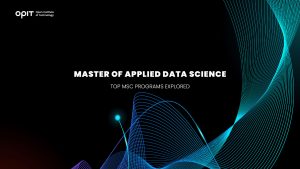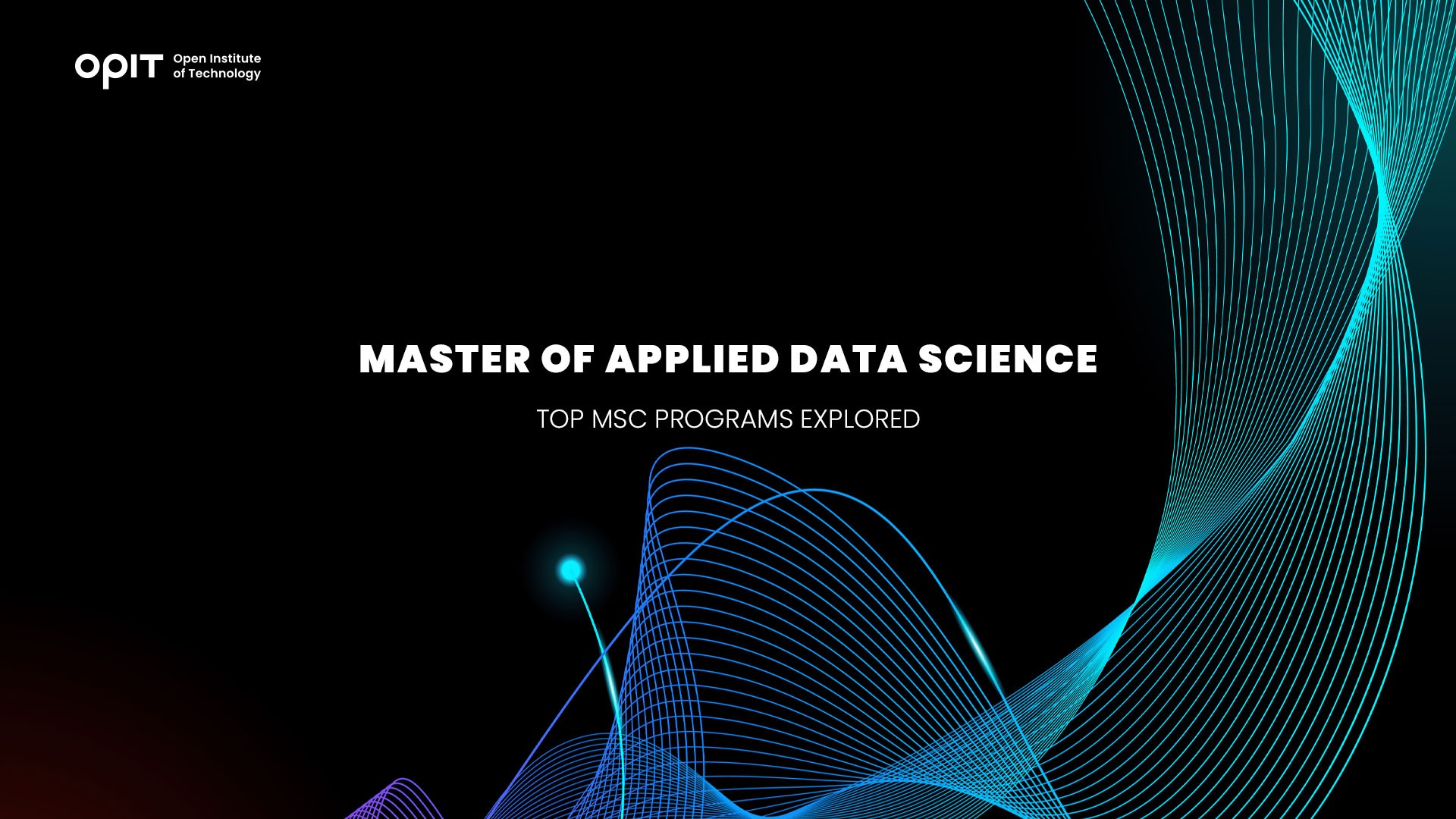If a theoretical data scientist is somebody who’s mastered the art of extracting and analyzing large datasets, an applied data scientist is someone who can put that mastery into real-world practice. They’re insight specialists. And those insights come using techniques like machine learning and data mining to parse through extensive datasets to find patterns and outcomes.
As a prospective Master of applied data science, you may wonder if this career path is the right choice for you. It is, as long as you want to be part of a growing industry. According to Precedence Research, the data science industry is expected to achieve a compound annual growth rate (CAGR) of 16.43% between 2022 and 2030. That CAGR translates into growth from $112.2 billion in value (approx. €103 billion) to $378.7 billion (approx. €349 billion).
That growth alone demonstrates why getting an applied data science MSc could be valuable to your career prospect. Let’s look at three of the top courses on offer to European and international students.
Top MSc Programs in Applied Data Science – Our Criteria
Before digging into the best Master applied data science programs, it’s important to establish the criteria we’ve used to make our selections. The following five factors play a role:
- Reputation and ranking – While overall university rankings denote the quality of an establishment, we’re more interested in the reputation the specific course has in the industry.
- Curriculum and Sspecialization – What will you study and how will the topics you delve into lead to further specialization? We aim to answer both questions for our selections.
- Faculty expertise – When analyzing faculty expertise, we’re looking for a combination of experienced educators and mentors with real-world experience in data science work.
- Industry connections and partnerships – You want to use your MSc in applied data science to find work. A university that has strong connections to industry leaders (either through faculty or partnerships) can propel you forward in your career.
- Career support and alumni network – Speaking of connections, a good alumni network exposes you to peers who can help your career. Combine that with in-house career support from the university, and you get a course that offers more than a basic education.
Top MSc Programs Explored
After applying the above criteria, we’ve come up with a list of three Master of applied data science programs to pique your interest.
Program 1 – Master in Applied Data Science & AI (Open Institute of Technology)
Available as a fully online course for those who value self-learning, the Open Institute of Technology’s (OPIT’s) program lasts for 18 months with costs starting from €4,950. There’s also a fast-track option available for those who can commit to more extensive studies, with that program offering the same degree in just 12 months.
The educational aspect of the course is divided across two terms. In the first term, you’ll focus primarily on principles and techniques in areas such as Python programming, machine learning, and how to use data science to solve business problems. The second term gets more practical as you start to focus on applications of data science (and AI) in the real world before digging into the ethics behind your work.
As for credentials, OPIT is an accredited institution under the European Qualification Framework and its MSc was created by Professor Lorenzo Livi. Serving as program head, Livi brings the expertise he’s developed through teaching and research at both the University of Exeter and the University of Manitoba to the program.
It’s this focus on attracting international faculty that’s the most attractive part of the course. Beyond Livi, the faculty includes professors from institutions as diverse as the University of California, University of Copenhagen, Microsoft, and the Naval Research Laboratory. This mix of academic excellence and professors with real-world experience can lead you to exciting career opportunities and connections.
Check out OPIT degrees
-
Career aligned
-
Fully Online
-
EU-accredited institution
Program 2 – Master of Science in Data Science (ETH Zurich)
Ranked as the ninth-best computer science university in the world by Research.com, ETH Zurich has a program that stands out thanks to its Data Science Laboratory. This dedicated facility allows students to utilize their theoretical knowledge on simulated practical problems. Process modeling and data validation get put into practice in this lab, all under the oversight of an experienced mentor.
Speaking of faculty, several members of ETH Zurich specialize in teaching data science in relation to the medical field. Both Gunnar Rätsch, a full professor at the university, and Julia Vogt, an assistant professor can directly aid students who wish to apply their data science expertise to medicine.
Career support comes in the form of a dedicated Career Center, which serves as a central hub for students and the companies with which the university partners. ETH encourages partnership through industry events, such as its Industry Day, which encourage local and national businesses to meet with and discuss the work of its students. These events may prove vital to starting your data science career before you’ve even completed your Master of applied data science.
Coming back to the program, it’s a two-year full-time course through which you’ll earn 120 credits per the European Credit Transfer and Accumulation System (ECTS). Prospective students need to have at least 180 ECTS credits from a relevant Bachelor’s degree, such as a BSc in computer science or mathematics. The program costs CHF 730 (approx. €749) per semester, with the option to make voluntary contributions to things like the university’s student union and its Solidarity Fund for Foreign Students.
Program 3 – MSc Data Science (IU International University of Applied Science)
Our final program takes us to Germany and one of the most flexible applied data science MSc programs in Europe. Offered in conjunction with London South Bank University, this program results in graduation with a dual degree with both German and British accreditation. You have a choice between taking the two-year program for €556 per month or a pair of part-time programs. The first of the part-time options lasts for 36 months, costing €417 per month, with the second being a 48-month course costing €329 per month.
The course itself focuses primarily on current developments in the data sector, with modules on Big Data, infrastructure engineering, and software development included. The first semester introduces you to machine learning and deep learning concepts, in addition to offering a model engineering case study so you can get your feet wet with applied data science. The second semester makes room for specialization, as you choose an elective that may focus on Big Data, autonomous driving, or smart manufacturing methods.
Faculty members include Professor Thomas Zoller, who oversees the university’s BSc in data science program in addition to contributing to its Master’s program. His expertise lies in machine learning in the context of image processing, in addition to the use of AI and advanced analytics in digital transformation.
As you move closer to wanting to start your career, IU International’s Career Office comes into play. It holds weekly group career talks, both online and on-campus, in addition to daily slots for one-to-one chats with advisors over Zoom or email. You also get access to the university’s Jobteaser platform, which puts you in direct contact with potential recruiters.
Factors to Consider When Choosing an Applied Data Science MSc
The three programs highlighted above each offer a combination of a stellar education and industry connections that help you to get your data science career started. But if you want to do further research into applied data science MSc programs, these are the factors to consider.
Your Personal Goals
Though it may seem obvious to state, your personal goals play a huge role in your decision. For example, somebody who wishes to work in the medical field may favor ETH Zurich’s offering due to the expertise of its faculty, whereas that course may not be the best choice for those interested in finance. Think about what you want to achieve and which program aligns with those goals.
Program Cost
A Master of applied data science doesn’t come cheap. Most courses cost several thousand euros, though you’ll often find that online courses are more manageable from a cost perspective. Consider the program cost and research financial aid options, such as those highlighted on the EURAXESS portal, when making your choice.
Program Format
A full-time MSc in applied data science may be great for a young student with no other commitments. But it won’t work so well when you’re trying to fit your education around work, life, and your family. Think about the time commitment the program asks of you. Many find that a part-time or self-learning-driven online course is easier to fit around their schedules than a full-time on-campus program.
Location and Campus Facilities
If you opt for an online course then location isn’t an issue – you can study from home. But those studying on-campus have to consider the location (is the university situated in a business hub, for example) and the facilities offered on-site to help them further their data science careers.
Networking Opportunities
Networking opportunities can come in many forms in a Master of applied data science program. Faculty is the obvious source of connections, with many educators having worked (or still working) directly in the industry, but don’t underestimate the connective powers of your peers. Furthermore, take advantage of any career support facilities your university offers to get yourself in front of prospective employers.
Get Your MSc in Applied Data Science
Think of choosing an applied data science MSc in the same way you’d think about making an investment. You want that investment (both in time and money) to offer a suitable return. The three programs listed here offer superb qualifications and give you the real-world experience needed to forge a career in the applied data science sector. Choose the program that suits your needs, or, use the advice provided to research other programs that are closer to home or more in line with your career goals.
Check out OPIT degrees
-
Career aligned
-
Fully Online
-
EU-accredited institution






